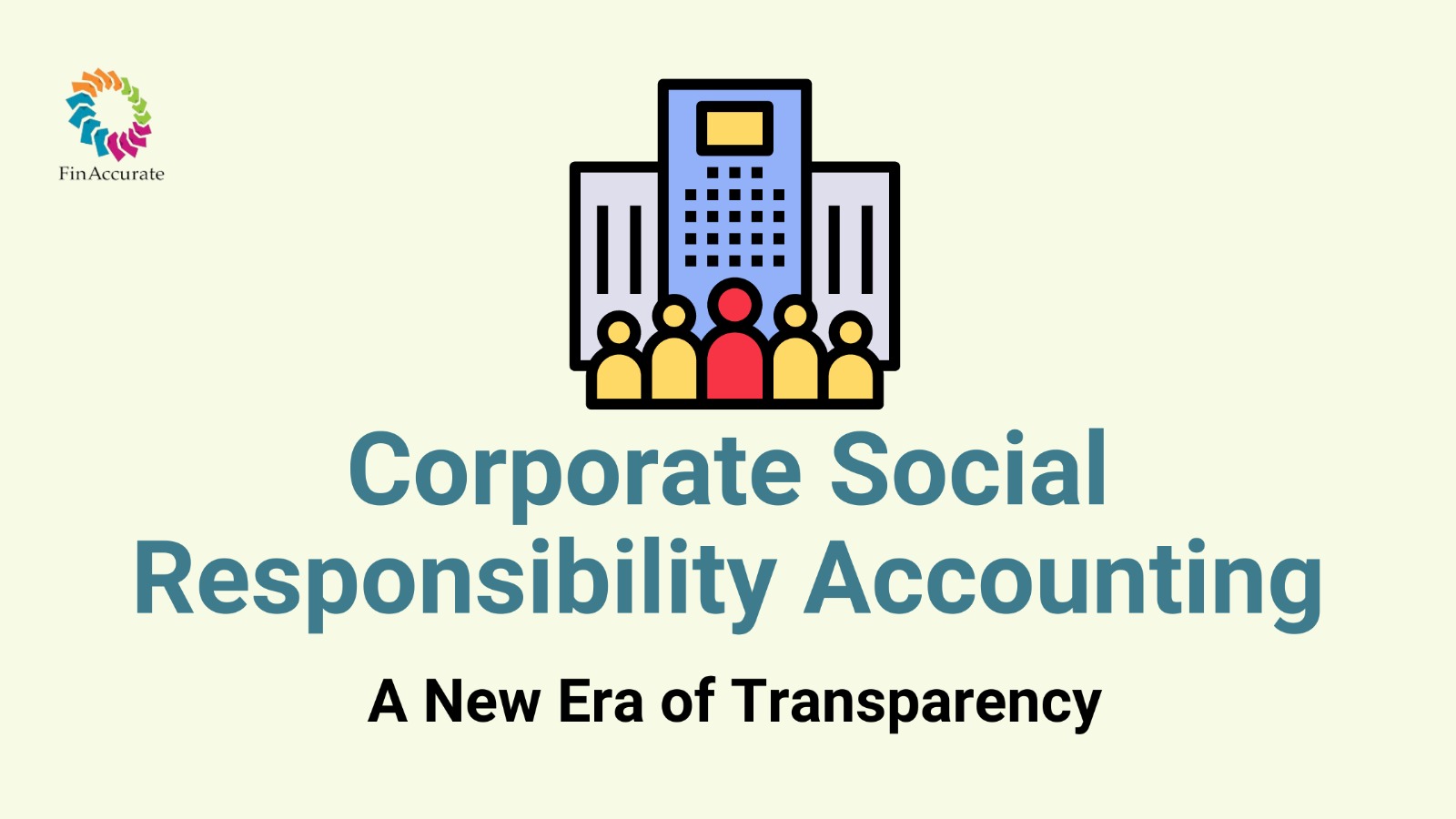Revolutionize your company’s CSR accounting with the latest strategies for improved transparency. Learn how to leverage new technologies to track progress and create a more sustainable future.
The 21st century has ushered in a new era of corporate transparency and accountability. Companies are now expected to be socially responsible and account for their activities in ways that benefit society as a whole. Corporate Social Responsibility (CSR) accounting is the practice of evaluating, reporting, and managing a company’s social and environmental impact. It is an essential tool for companies to ensure that their business practices align with their commitment to responsible corporate citizenship. This blog post will explore the importance of CSR accounting and how it can be used to foster greater transparency and trust in the corporate world.
Also Read: Tax Credit: What It Is, How It Works, Who Qualifies
What is Corporate Social Responsibility, or CSR?
Corporate social responsibility (CSR) is a business concept that helps a corporation be socially responsible to itself, its stakeholders, and the public. By doing corporate social responsibility, which is also called corporate citizenship, firms can be aware of how they affect the economy, society, and the environment as a whole.
CSR indicates that a firm does business in ways that help society and the environment instead of hurting them.
How to Understand Corporate Social Responsibility (CSR)
Corporate social responsibility is a big idea that can mean different things for different companies and industries. Businesses may help society and build their brands at the same time by doing things like CSR programs, charity, and volunteer work.
Corporate Social Responsibility Types
Corporate social responsibility can be broken down into four primary forms. A firm can choose to undertake any of these things on its own, and not doing something does not mean that a company is not socially responsible.
1. Environmental Responsibility
The foundation of corporate social responsibility is taking care of nature, which is why environmental responsibility is so important. A corporation can make sure it leaves natural resources in better shape than before by running its business well and giving money to connected charities. Companies typically try to be good stewards of the environment by:
- Through the way it is made, it reduces pollution, waste, the use of natural resources, and emissions.
- It recycles items and materials throughout its processes and encourages its customers to do the same.
- Offsetting negative effects by restoring natural resources or giving money to groups that can help balance out the company’s effects. For instance, a company that cuts down trees may promise to plant the same number or more.
- Distributing things in a way that is good for the environment by adopting techniques that cause the least pollution and emissions.
- Putting together product lines that support these principles. For instance, a company that sells gas lawnmowers might also make electric ones.
2. Ethical Responsibilities
Ethical responsibility is the cornerstone of corporate social responsibility. It is based on doing things in a fair and honest way. Companies often create their own standards, but sometimes ethical ideals are set by outside forces or by what clients want. Some examples of moral responsibility are:
- Treat all consumers the same way, no matter their age, race, culture, or sexual orientation.
- Positive treatment of all employees, including wages and benefits that are better than the minimums required by law. This includes giving everyone an equal chance at getting a job, no matter how different they are.
- Changes to the way vendors are used so that they can work with people of different colors, genders, economic backgrounds, and Veteran statuses.
- Investors should be told the truth about operating problems in a timely and polite way. Even if it’s not necessarily required by law, a firm may choose to manage its relationships with outside stakeholders in ways that go beyond what’s required by law.
Also Read: 10 Proven Tax Saving Strategies for Self-Employed
3. Philanthropic Responsibility
Corporate social responsibility is based on philanthropic responsibility, which challenges how a firm operates and how it helps society. Philanthropic responsibility is, at its most basic, how a firm uses its money to make the world a better place. This involves:
- Whether or not a business gives its profits to charities or causes it supports.
- Whether or not a corporation exclusively does business with suppliers or vendors that share the same values as the company.
- Whether a corporation helps its employees do good things by giving them time off or matching their donations.
- Whether a corporation sponsors fundraising activities or has a presence in the community for similar events.
4. Financial Responsibility
Financial responsibility is part of corporate social responsibility that connects together the other three aspects. A firm may set goals to be more focused on the environment, ethics, and giving back to the community. However, the company must invest money in programs, donations, or product research to back up these intentions.
This means spending money on:
- Research and development to come up with new items that help the environment.
- Getting different kinds of skills means having a diversified group of workers.
- Initiatives that teach employees about DEI, being socially aware, or caring about the environment.
- Processes that might cost more but have better CSR outcomes.
- Making sure that financial reports are clear and on time, including external audits.
Benefits of Corporate Social Responsibility
CSR is important for the community, but it is also important for a business. CSR activities can help employees feel more connected to their companies and the world around them. They can also raise morale and help both employees and employers feel more connected to the world. Aside from the positive impacts to the planet, here are some additional reasons businesses pursue corporate social responsibility.
1. Brand Recognition
According to a study published in the Journal of Consumer Psychology, consumers are more inclined to act kindly towards a firm that has worked to aid its customers as opposed to organizations that have shown an ability to offer superior items.
Customers are increasingly becoming more aware of the impacts companies can have on their community, and many now base purchasing decisions on the CSR aspect of a business. As a company engages more in CSR, they are more likely to receive favorable brand recognition.
2. Investor Relations
A study by the Boston Consulting Group found that companies seen as leaders in environmental, social, or governance issues were worth 11% more than their competitors.
Companies that want to stand out and do better than the market prefer to use CSR tactics. These initiatives have a beneficial effect on how investors feel about an organization and how much they think it is worth.
3. Employee Engagement
In yet another study, professionals from Texas A&M, Temple, and the University of Minnesota found that CSR-related values that align firms and employees serve as non-financial job benefits that help keep employees.
Workers are more inclined to stick around a firm that they trust in. This in turn minimizes staff turnover, frustrated workers, and the total cost of a new employee.
5. Risk Management
By following Corporate Social Responsibility (CSR) practices, companies can reduce the risk of costly lawsuits, litigation, or legal proceedings that may arise from activities such as discrimination against employee groups, disregard for natural resources, or unethical use of company funds. Additionally, they can avoid negative press coverage by avoiding such activities.
Why Should Small Businesses Implement CSR Strategies?
Many companies think that CSR is an important part of their brand image because they think that customers will be more likely to buy from brands that they think are more ethical. In this way, CSR activities can be an important part of public relations for a business. At the same time, some company founders are also motivated to engage in CSR due to their convictions.
Also Read: 5 Must Know Tax Filing Strategies For Every Small Business Owner
Why Is CSR Important?
Small businesses can also participate in Corporate Social Responsibility (CSR) initiatives, even on a smaller scale. For instance, they can donate to local charities and sponsor local events. Additionally, many companies have taken steps to improve the environmental sustainability of their operations, such as installing renewable energy sources or purchasing carbon offsets. Finally, some businesses have taken measures to ensure ethical labor practices, like getting rid of child labor and slavery in their supply chains.
Conclusion
In conclusion, corporate social responsibility accounting is a new and vital tool for business transparency and sustainability. Providing more accurate and reliable data on a company’s social and environmental impact can help stakeholders make better decisions and help companies become more sustainable. As the concept of corporate social responsibility continues to evolve, it is important that companies embrace this tool and use it to become more transparent and accountable. Ultimately, corporate social responsibility accounting can help create a more sustainable and equitable world.
Jay’s Choice:-
1. The Benefits of Cloud-Based Accounting for Small Businesses
2. Cryptocurrency and Taxes: What You Need to Know
3. How Artificial Intelligence is Revolutionizing Accounting Industry
4. The Future of Financial Management: Trends to Watch in 2023
5. Sustainability Accounting: The Key to Building a Greener Business
6. Corporate Social Responsibility Accounting: A New Era of Transparency






